Mortal Shell is set in a decaying dark fantasy world filled with brutal do-or-die melee combat and enigmatic characters. I play as the Foundling, a gaunt and otherworldly figure who arrives in a land called Fallgrim. Discovering a shattered tower in a fetid swamp, the Foundling frees a wretched creature they find imprisoned there. The creature makes a request: Bring it glands taken from the corpses of revered figures in Fallgrim’s three temples so it can heal itself. Apparently having nothing better to do, the silent Foundling sets out to fulfill this unsavory task for an obviously evil monster. Their task is deadly, as the swamp is filled with territorial bandits while the temples themselves house more powerful and terrible dangers. Yet all of these threats may be nothing compared to the creature to whom the Foundling finds themself enthralled.
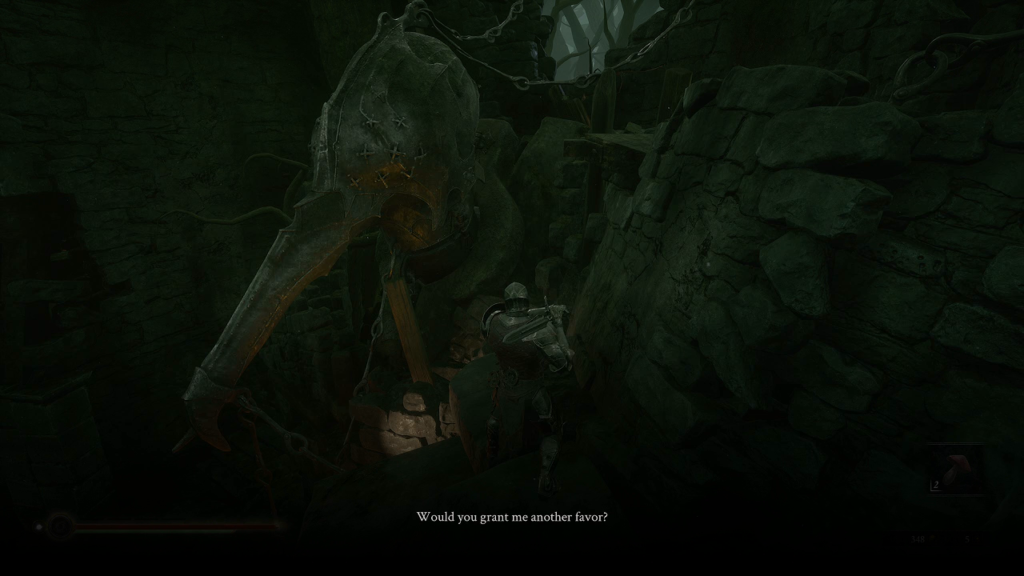
Mortal Shell feels instantly familiar. It is a shameless imitator of FromSoftware’s infamous Dark Souls series, borrowing many of its mechanics and outright copying its philosophy towards combat. Combat is perilous, with even simple enemies able to take away large chunks of the Foundling’s health meter. When the meter empties, they die, drop all of their gathered resources—here called Tar, short for Nektar—and return to their last checkpoint. If they can return to where they died, they can reclaim the dropped Tar. If they die again, the Tar is lost forever.
Stamina powers the Foundling’s combat prowess. Every swing of their weapon and dodge away from an enemy’s attack drains some of the meter. If it is empty, they can no longer attack or execute defensive dashes and rolls and must wait a moment for the meter to refill. This restriction mandates methodical play. Like Dark Souls, Mortal Shell may appear to be a hack-and-slash action videogame, but mashing the attack button will only result in the Foundling being left defenseless. Even brief moments of vulnerability can result in instant, humiliating death.
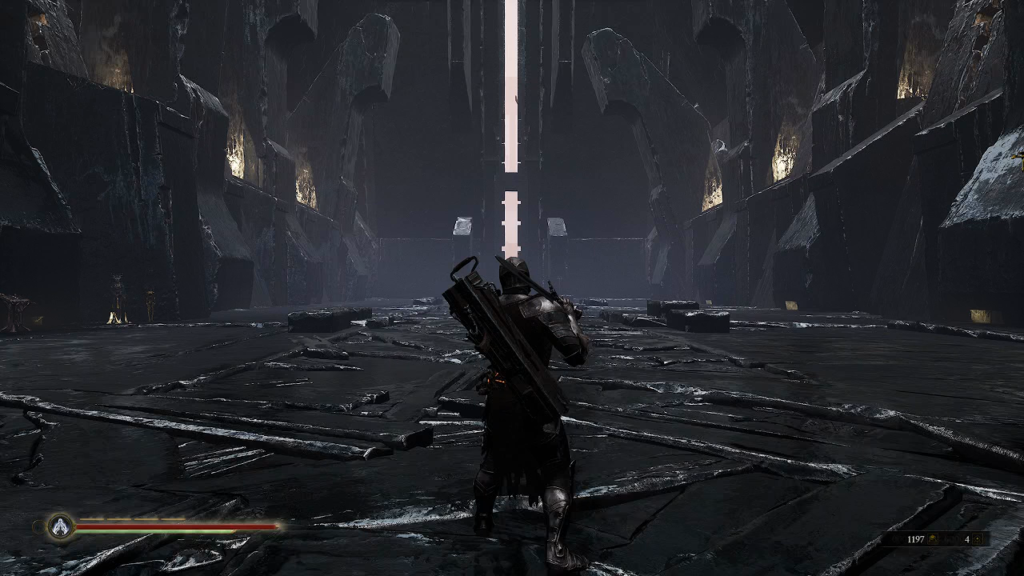
Mortal Shell does not totally plagiarize from its inspiration. It makes a few thoughtful changes to familiar systems that feel distinct, even if only just so. For the health and stamina meters, and every other aspect of the Foundling’s RPG statistics, totals are predetermined and static. This turns the combat into a pseudo-Dark Souls challenge mode. I can’t overcome a difficult boss or troublesome enemy pack by grinding up one of the Foundling’s lacking attributes. Obstacles must be surpassed with forethought and skill instead.
My inability to improve the Foundling’s statistics does not mean I am without options, however. They are a fragile being, dying in a single hit even from the bloated frogs that aggressively protect their swamp homes from intruders. To protect themself, the Foundling can inhabit the bodies of fallen adventurers. These Shells all have different health and stamina totals as well as unique combat abilities.
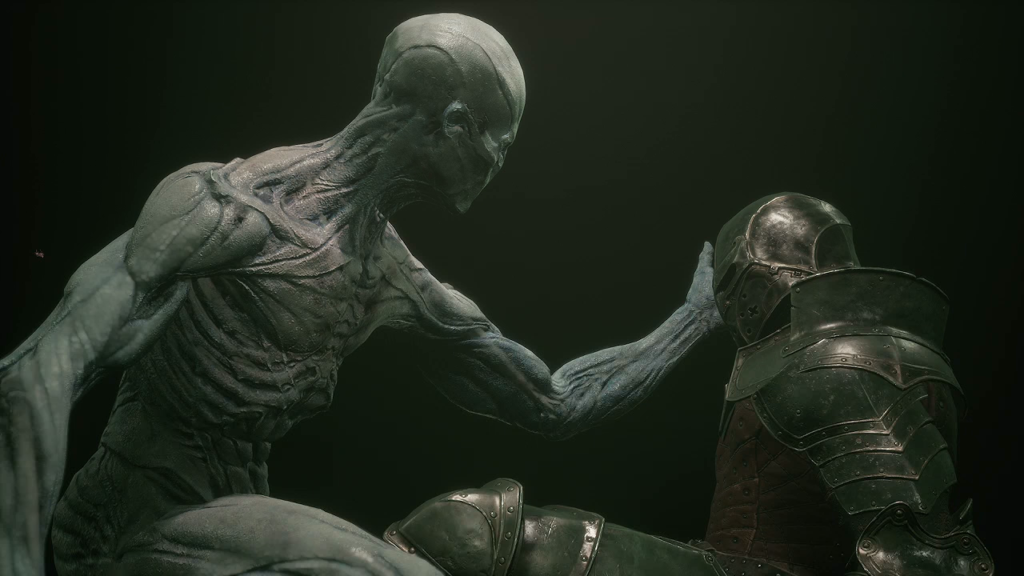
Just around a corner from where the Foundling enters Fallgrim, they discover the body of Harros the Vassal. Harros is a worthy first Shell, possessing balanced health and stamina and abilities that restore its health when picking up Glimpses, an uncommon enemy drop. As the Foundling explores Fallgrim, they can discover three other Shells with new abilities and varying balances between health and stamina.
Which Shell the Foundling uses comes down to my preference. A Shell with a longer stamina bar lets them attack more aggressively but a comparatively shorter health bar means they die in fewer hits. A Shell with more health allows for more mistakes to be made in combat, with the caveat that the Foundling can only swing their weapon two or three times before exhausting themselves. Switching between Shells is as simple as visiting the shattered tower at the swamp’s center and selecting one from the crypt where they are stored. After spending time with all four Shells, I find myself favoring Harros. His balanced health and stamina bars let me make a few clumsy or careless mistakes while allowing some latitude for my aggressive playstyle.
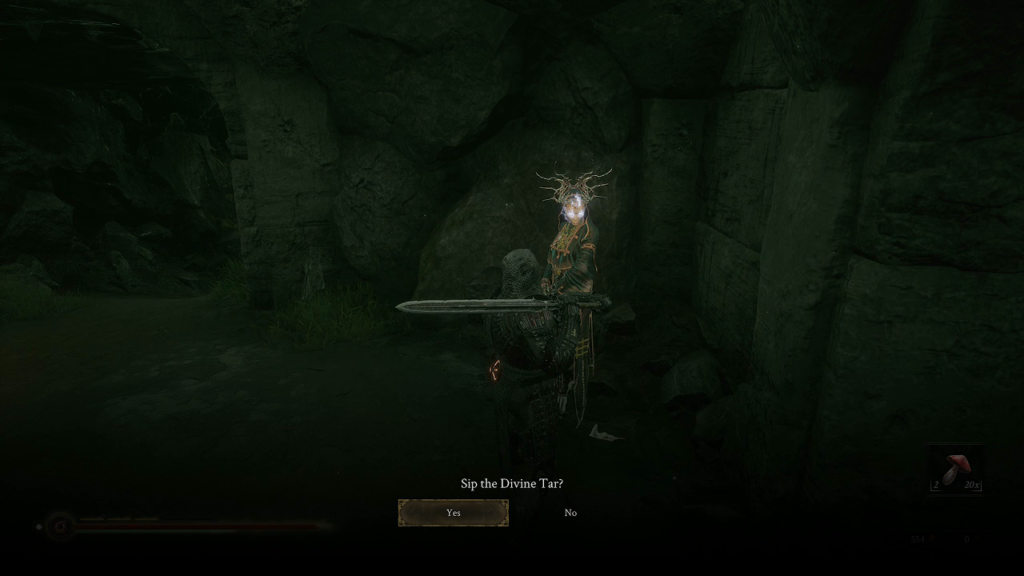
Each Shell’s abilities are unlocked using Tar and Glimpses. Both of these valuable resources drop from defeated enemies. Tar is shared between all Shells, while Glimpses are exclusive to the Shell that picks them up. This clever system lets me enrich the Foundling with as much tar as they can carry but restricts unlocking the other Shell’s abilities without spending time playing with them.
Each ability is represented by a lost memory within the Shell. Spending Tar and Glimpses with Sester Genessa, one of the few friendly characters the Foundling encounters, recovers a memory and unlocks an associated ability. Each memory narrates a fragment of the shell’s former life, providing context to their death and connecting them with the other named characters the Foundling encounters around Fallgrim. This system admirably combines character development with game mechanics. The more memories the Foundling restores to a Shell, the greater the understanding it gains of that vessel, represented by a growing mastery of its abilities.
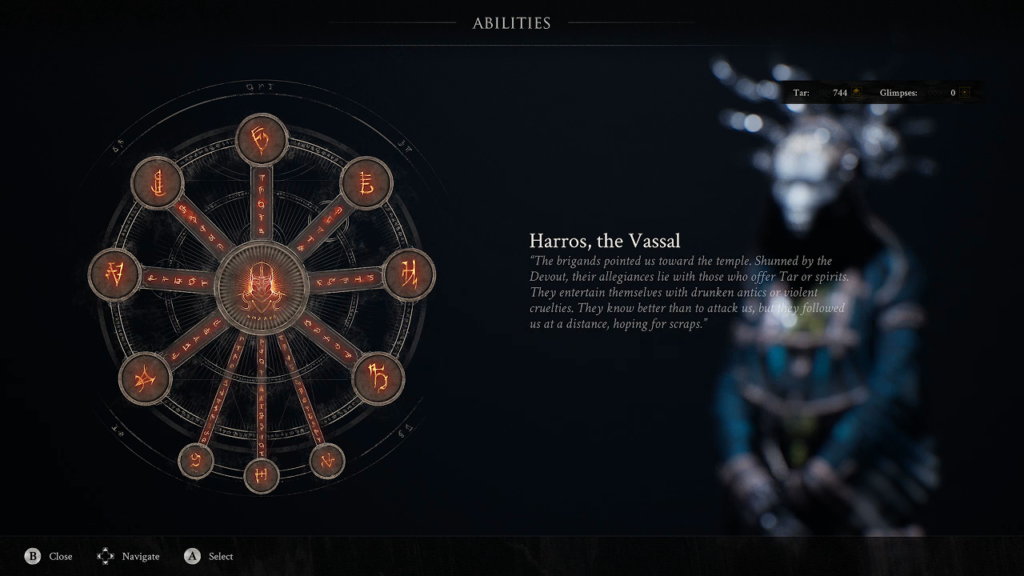
It takes surprisingly little time to unlock all of a Shell’s memories. After an early learning period, I am bemused to find I have already restored all of Harros’ missing memories before finishing even the first temple. Uninterested in grinding glimpses for the other three Shells, this leaves more than two-thirds of the quest where I have nothing to spend excess Tar on except hundreds of healing rat kabobs from a friendly merchant.
Customization choices are not only differentiated by which Shell the Foundling occupies. Each may also equip one of four available weapons. Like the Harros, the Foundling stumbles across their first weapon, the Hallowed Sword, as they enter Fallgrim. The remaining three weapons must be earned in combat with a powerful foe named Hadern in each of Fallgrim’s temples.
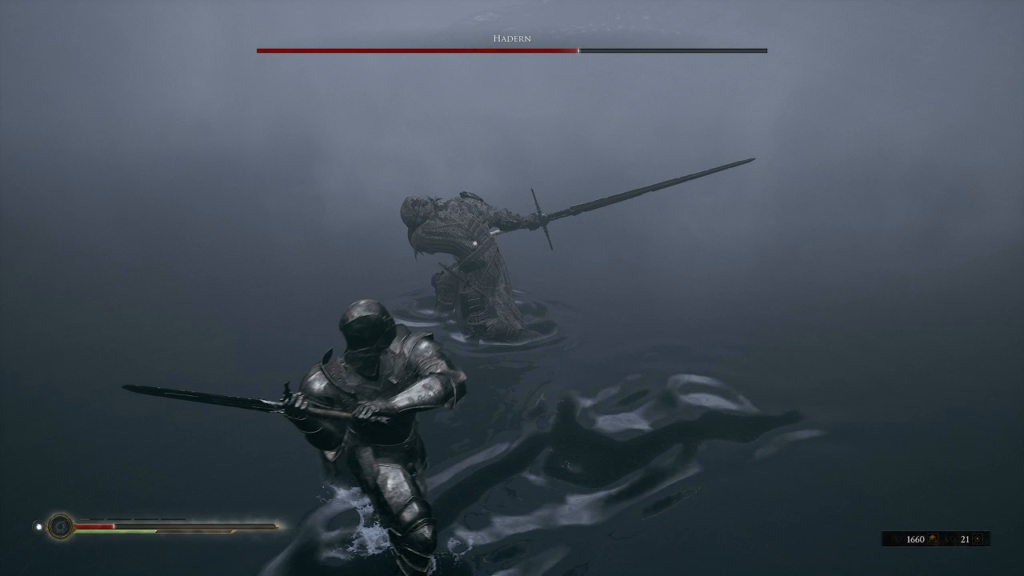
None of these weapons are especially exciting to wield, ranging from oversized to comically oversized swords to a short hammer and pick to a long, heavy hammer. As with Harros, I find myself gravitating towards the first weapon the Foundling discovers, the Hallowed Sword, if only because I am already familiar with it through unlocking the other weapons.
Mortal Shell feels most like Dark Souls through its philosophy of upgrading weapons. No matter how much Tar I pour into restoring a Shell’s memories, the new power this grants to the Foundling is nothing compared to what upgrading its weapons accomplishes. This makes weapon upgrades the most satisfying discoveries I make while exploring Fallgrim. They are typically the best-hidden and provide the most noticeable improvement to the Foundling’s performance.
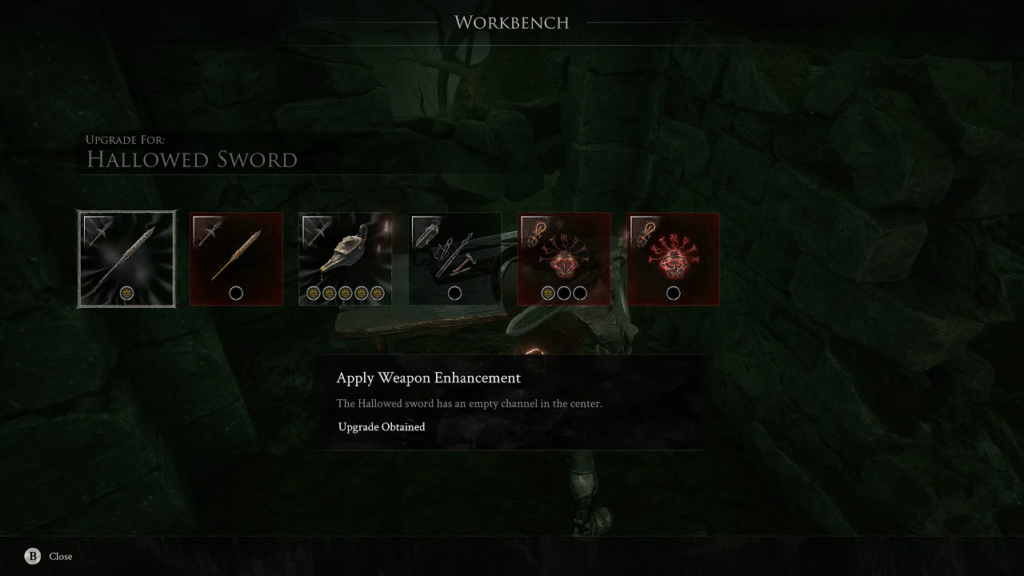
Like using Tar to restore Harros’ memories, I power the Hallowed Sword to its highest level before I finish the first temple. This leaves me with an awkward feeling of achieving the player character’s greatest level of strength before reaching the first boss and with two-thirds of Fallgrim still to explore.
Mortal Shell differentiates itself most significantly from its inspiration through its combat options. There is a contingent of Dark Souls players who have never confronted that series’ various beasties and nasties without a shield strapped to their player character’s offhand. I count myself among this foolhardy brigade, so I struggle at Mortal Shell’s outset due to its lack of a proper shield.
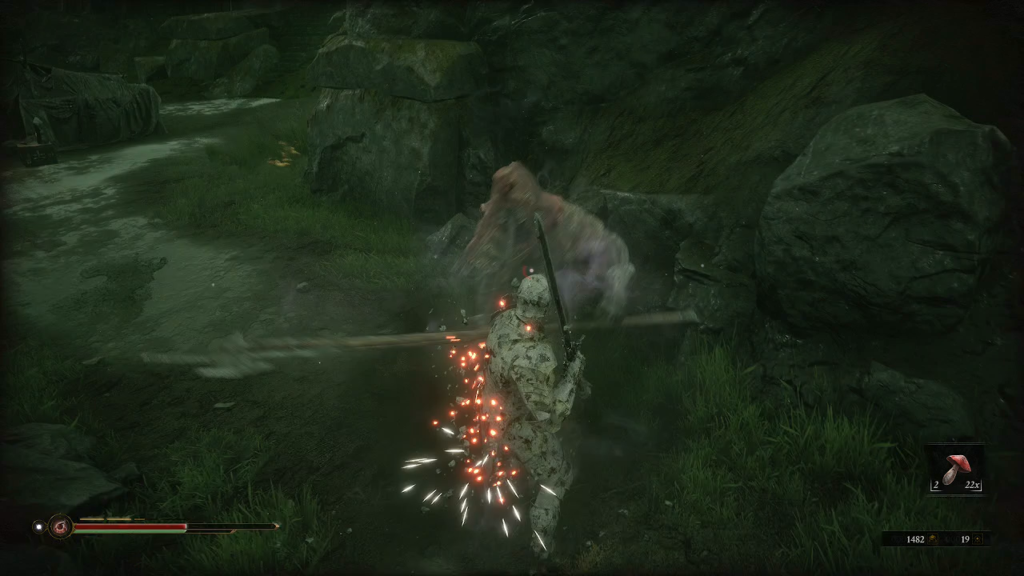
In lieu of a shield, the Foundling has the ability to Harden, turning its current body into stone and deflecting most attacks which strike it. Harden can be activated at almost any time, including mid-attack, though it cannot be used again for a few more seconds. This creates interesting avenues of aggression. One of Harros’ memories restores the Foundling’s stamina when they Harden, encouraging me to rush at an enemy sword swinging, Harden when they counterattack, then return to fleshy form to continue attacking with renewed stamina. This tactic, carefully applied, is enough to overwhelm most standard enemies the Foundling encounters.
Misusing Harden—or as I am prone to doing, forgetting to use it at all—and taking a fatal blow does not mean the end of the Foundling’s current videogame life. When a Shell’s life bar empties, it becomes permanently Hardened and the Foundling is expelled from its back. Only here are they truly vulnerable; another blow from any source will send the Foundling back to the last checkpoint, but they may continue fighting in their vulnerable form, or I can carefully maneuver them back to their Shell. Touching the Shell returns it to the Foundling’s control with restored life and stamina, granting them a second chance. This only works once. If the Foundling is expelled from its Shell a second time, it means an instant game over.
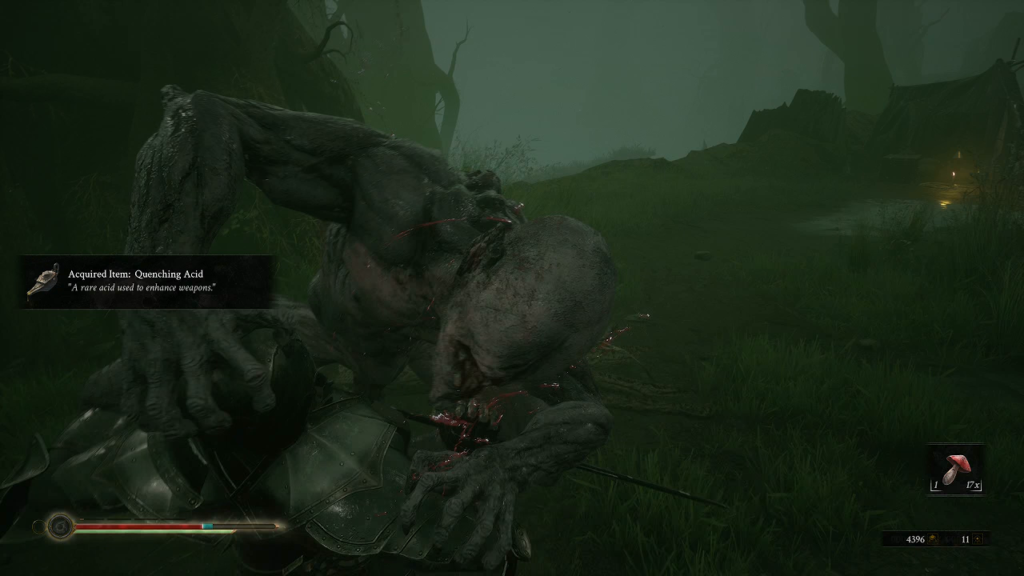
Where I most struggle is how Mortal Shell differentiates itself with healing. It offers no alternative to the Estus Flask, the powerful and reliable healing item iconic to Dark Souls player characters. Instead, I heal the Foundling by directing them to eat Weltcaps, an abundant mushroom in Fallgrim, and Roasted Rats, an apparent local delicacy. These apply a slow healing-over-time effect that is not especially useful in active combat.
If I desire the immediate life-restoring effect of the Estus Flask, the Foundling must use the Tarnished Seal. Found in the shattered tower when the Foundling frees the bound creature, the Seal can be used in combat to parry enemy attacks. These parries can be followed up with a counterattack that instantly restores a large portion of the Foundling’s life bar. This is where the challenge lies; instead of the safety and reliability of an instant heal at a safe distance, I must place the Foundling in greater danger of death to restore their health. I am terrible at parrying in almost any videogame, and Mortal Shell is not an exception. The Tarnished Seal’s gamble is one I rarely take as I frequently lose.
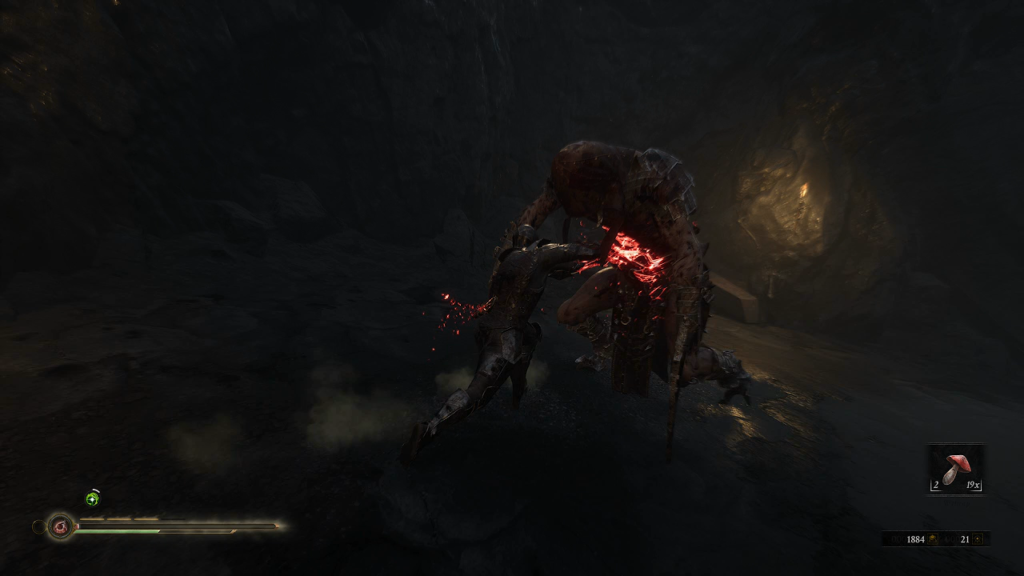
Luckily, the Tarnished Seal is not a gamble I have to make often. The varied enemies who dwell in Fallgrim resist admirably during the Foundling’s first few hours there. Deaths are frequent and progress is slow. This changes when I make a foundational discovery: Mortal Shell’s enemies are dumb.
My biggest roadblocks at the outset are the large bandits that patrol the swamp’s outer edges, close to the temple entrances. More than twice the size of the other bandits I have encountered until then and wielding massive halberds, they can crush the Foundling’s Shells in a few hits. I soon find a winning tactic. Open with a running jump attack, a more powerful swing that uses most of the Foundling’s stamina. This leaves just enough stamina to roll away from the bandit’s counterattack. I keep the Foundling’s distance until their stamina regenerates, then jump attack and roll away again. I keep doing this until the bandit dies.
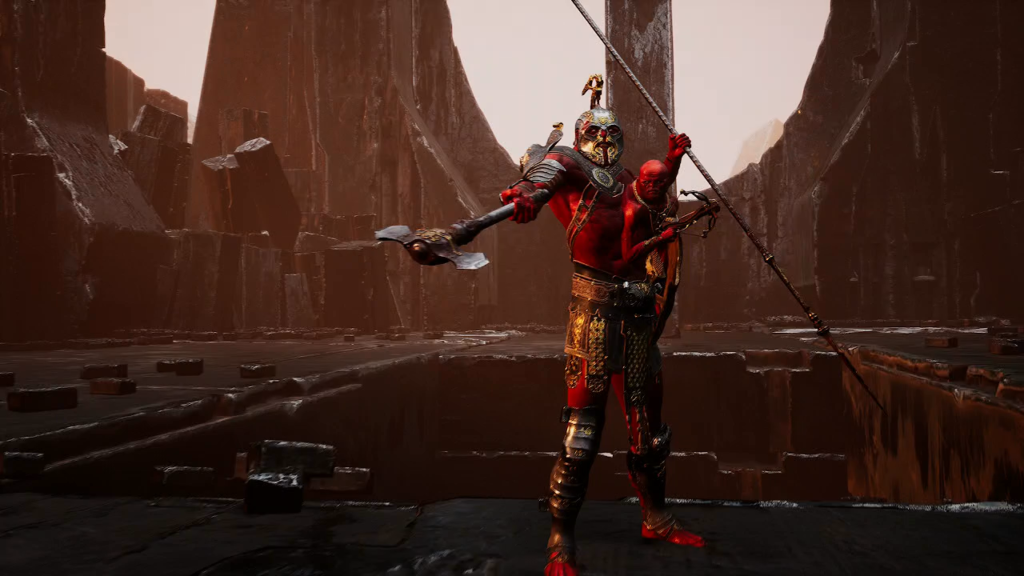
Here is where there’s a problem: This tactic works against every enemy in Mortal Shell. Every single one. Including bosses. Once I discover this, the early challenge evaporates and never returns.
Mortal Shell’s biggest flaw is that, as much as it imitates Dark Souls, it is not Dark Souls. That series’ difficulty is widely overstated in both videogame fandom and the wider popular consciousness, but its enemies, and particularly their attack patterns, are varied enough that I cannot use the same strategy throughout. Once I am settled into Mortal Shell, it becomes Jump-Attack-Then-Roll: The Videogame. Only its relative brevity—I conquer its three temples and climactic final boss in about ten hours—prevents it from becoming repetitive.
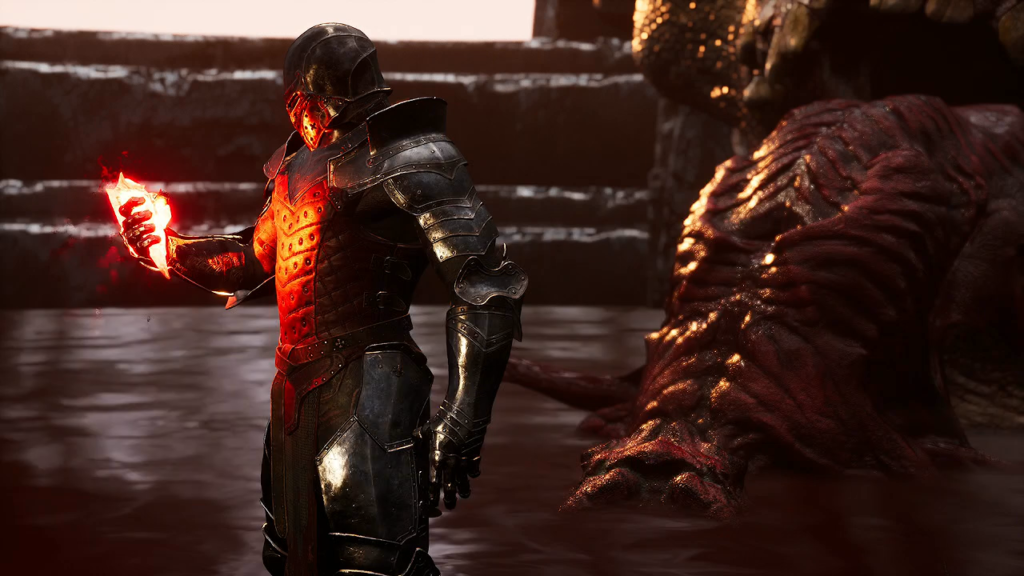
Mortal Shell is a deliberate imitator of a much larger, much more infamous videogame series. It smartly capitalizes on its few but notable differences to create a unique experience, but the more I play the more I recognize its limitations. Shells and weapons are easily boosted to their maximum power only a short while into my playtime. There’s almost no reason to use Hardening or the Tarnished Seal, the abilities that really make it unique. And enemies are dumb as the stumps and rocks they mindlessly patrol. A Dark Souls veteran, looking to test their mettle in a smaller environment with stripped down RPG systems, will find it offers little challenge. I don’t see a single reason a neophyte should play this. Mortal Shell is a contradiction: an inadequate and acceptable alternative.